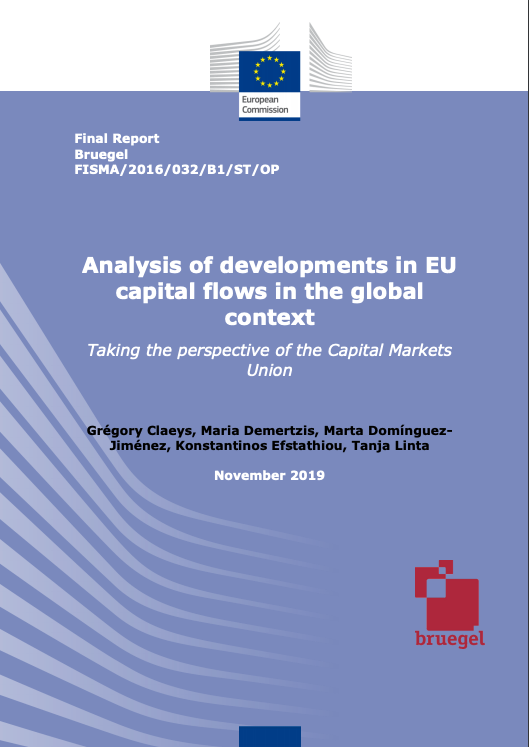Blog Post
What is fuelling the Dutch house price boom?
Housing prices have been rising fast in the West of the Netherlands in the last five years. However, mortgages outstanding have remained flat, raising the question of what has driven the increase. Evidence suggests that housing supply constraints have, this time around, played a role in pushing the house prices up.
House prices have been rising again in recent years in several euro-area countries, but mortgage credit has not (as noted in a recent Bruegel blog post). The Netherlands is one example. Dutch house prices are currently 30% higher than during the post-crisis trough in the third quarter of 2013. However, although the current price rise might be sharper more rapid than in the years before 2009, it is less driven by an expansion in mortgage credit. While price rises between 2014 and 2016 were accompanied by a rise in new mortgages, this ceased to be true from 2017 (Figure 1, panel a). The total value of new mortgages granted declined in 2017 and moderated in 2018 and 2019, suggesting that factors other than credit are driving house prices in the Netherlands. The most notable of such factor is supply shortages in areas most in demand.
The net change in mortgages outstanding has been flat. The stock of mortgage loans outstanding increased by only 0.1% between Q1 2014 and Q3 2019 (Figure 1, panel b). This to a large degree has been caused by a surge in anticipated repayments of older mortgages. Returns on savings accounts are low, so it is relatively more profitable to repay older high interest loans, or to swap old loans for new low-interest loans. Nevertheless, from 2017 onwards, the evidence still points towards a decoupling of new mortgage credit and housing prices. Overall, the data suggests that this time around, Dutch people are relying to greater degree on their own savings when purchasing a house, meaning that the current boom is less driven by excessive leverage and carries less financial risk.
That said, the systemic risk linked to the Dutch housing market is still high, as reported in the Dutch central bank’s last financial stability review. Risk-taking behaviour is on the rise as more people take out loans close to or at the maximum authorised level, given their income. Banks are also considered at risk because of relatively low capital buffers on mortgage loans. Furthermore, the Netherlands still has one of the highest household debt-to-GDP levels in Europe. Tax incentives that favour mortgages also still exist (although they are being phased out). But judged on net mortgage movements alone, the facts do not match the story of a housing boom fuelled by a credit bubble.
Rising house prices have mostly been concentrated in the Randstad, the megalopolis composed of the country’s four major cities (Amsterdam, Rotterdam, Utrecht and The Hague) and their surroundings. In Q4 2019, prices in Utrecht were 39% percent above the level reached during the peak in 2008, while in the more rural province of Noord-Brabant they were only 3% above that level. These differences are related to a structural shift of the population towards major urban areas, which has accelerated since 2010. Between 2000 and 2009, population growth in the four major cities was slightly above 0.6% and not far above the rate for whole the country. But between 2010 and 2014, the population of those cities grew by 1.2%, roughly three times faster than the country overall. This has also had an impact on the demand for housing in areas surrounding the Randstad cities, as high housing prices drive families to look for housing in nearby towns, alongside the usual drivers for mid-aged cohorts to leave cities.
Another, but related issue has been the Netherlands’s notoriously low elasticity of supply of housing, because of various construction restrictions, causing prices to be highly volatile (see Caldera and Johansson, 2013 or Swank et al, 2002). These restrictions come in several forms:
- The Dutch urban planning system is fairly restrictive and many municipalities have tightened urban planning rules since the crisis. Construction permits are hard to obtain, as reflected by the World Bank’s Doing Business component on Dealing with Construction Permits, which ranks the Netherlands 88th, far behind its neighbours (Belgium 45th, Germany 30th).
- Population density in the Netherlands is high; this constrains available land for new construction. Öztürk et al (2018) showed that Dutch municipalities with a lack of developable land experienced faster rises in housing prices than those which are unconstrained.
- Construction capacity declined greatly during the crisis, preventing the supply of new housing from keeping up with market demand. Completion of new housing is still below its 2009 peak (Figure 2).
Meanwhile, rising income-to-value ratios make house ownership less accessible, especially for young newcomers to the housing market, with the potential for increasing intergenerational inequality (Fuller and Johnson, 2020). In addition, cities tend to attract younger generations, and rising prices in cities have driven starters to take out loans at the limits of their fiscal capacity, making them more vulnerable to financial risks. Ways must be found to increase housing supply in areas where prices are rising sharply. And as suggested by Claeys et al (2019), monitoring housing price developments more locally to formulate macroprudential policy would help to avoid local imbalances.
Recommended citation:
Brekelmans, S. (2020), ‘What is fuelling the Dutch house price boom?’, Bruegel blog post.
Republishing and referencing
Bruegel considers itself a public good and takes no institutional standpoint. Anyone is free to republish and/or quote this post without prior consent. Please provide a full reference, clearly stating Bruegel and the relevant author as the source, and include a prominent hyperlink to the original post.



